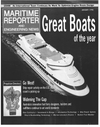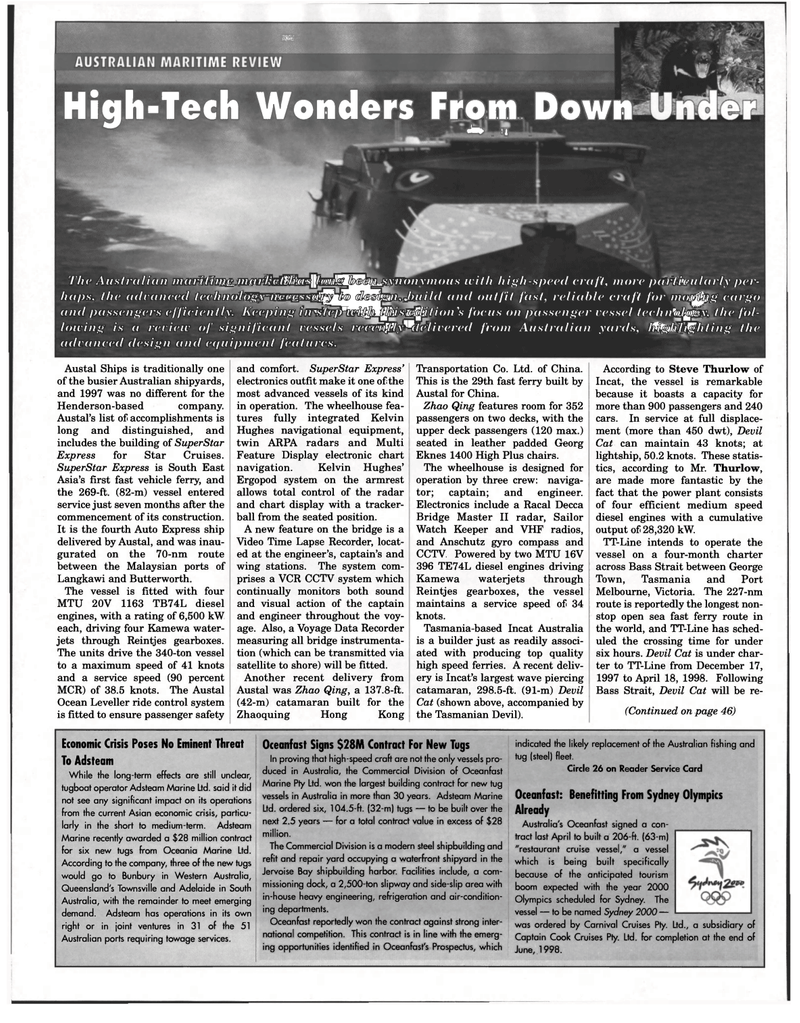
Page 38: of Maritime Reporter Magazine (January 1998)
Read this page in Pdf, Flash or Html5 edition of January 1998 Maritime Reporter Magazine
ifpii
High-Tech Wonders From Down jwl • ill 1
The Australian maritime market k a-*] Inn Sh^^LL s v» an xm on s with high-speed era ft, mare particularly per- haps, the adraneecl technolagx n ecessa i^p^^^^mn, build and outfit fast, reliable craft for mot^jug cargo and passengers efficiently. Keeping in step iFitflMtjtiJs mjtiHon '.s focus on passenger vessel tcchn%d^m\. the fol- lowing is a reriew of significant vessels rewqBy ^delivered from Australian yards, If^hji^hting the advanced design and equipment feat arcs.
Austal Ships is traditionally one of the busier Australian shipyards, and 1997 was no different for the
Henderson-based company.
Austal's list of accomplishments is long and distinguished, and includes the building of SuperStar
Express for Star Cruises.
SuperStar Express is South East
Asia's first fast vehicle ferry, and the 269-ft. (82-m) vessel entered service just seven months after the commencement of its construction.
It is the fourth Auto Express ship delivered by Austal, and was inau- gurated on the 70-nm route between the Malaysian ports of
Langkawi and Butterworth.
The vessel is fitted with four
MTU 20V 1163 TB74L diesel engines, with a rating of 6,500 kW each, driving four Kamewa water- jets through Reintjes gearboxes.
The units drive the 340-ton vessel to a maximum speed of 41 knots and a service speed (90 percent
MCR) of 38.5 knots. The Austal
Ocean Leveller ride control system is fitted to ensure passenger safety and comfort. SuperStar Express' electronics outfit make it one of the most advanced vessels of its kind in operation. The wheelhouse fea- tures fully integrated Kelvin
Hughes navigational equipment, twin ARPA radars and Multi
Feature Display electronic chart navigation. Kelvin Hughes'
Ergopod system on the armrest allows total control of the radar and chart display with a tracker- ball from the seated position.
A new feature on the bridge is a
Video Time Lapse Recorder, locat- ed at the engineer's, captain's and wing stations. The system com- prises a VCR CCTV system which continually monitors both sound and visual action of the captain and engineer throughout the voy- age. Also, a Voyage Data Recorder measuring all bridge instrumenta- tion (which can be transmitted via satellite to shore) will be fitted.
Another recent delivery from
Austal was Zhao Qing, a 137.8-ft. (42-m) catamaran built for the
Zhaoquing Hong Kong
Transportation Co. Ltd. of China.
This is the 29th fast ferry built by
Austal for China.
Zhao Qing features room for 352 passengers on two decks, with the upper deck passengers (120 max.) seated in leather padded Georg
Eknes 1400 High Plus chairs.
The wheelhouse is designed for operation by three crew: naviga- tor; captain; and engineer.
Electronics include a Racal Decca
Bridge Master II radar, Sailor
Watch Keeper and VHF radios, and Anschutz gyro compass and
CCTV. Powered by two MTU 16V 396 TE74L diesel engines driving
Kamewa waterjets through
Reintjes gearboxes, the vessel maintains a service speed of 34 knots.
Tasmania-based Incat Australia is a builder just as readily associ- ated with producing top quality high speed ferries. A recent deliv- ery is Incat's largest wave piercing catamaran, 298.5-ft. (91-m) Devil
Cat (shown above, accompanied by the Tasmanian Devil).
According to Steve Thurlow of
Incat, the vessel is remarkable because it boasts a capacity for more than 900 passengers and 240 cars. In service at full displace- ment (more than 450 dwt), Devil
Cat can maintain 43 knots; at lightship, 50.2 knots. These statis- tics, according to Mr. Thurlow, are made more fantastic by the fact that the power plant consists of four efficient medium speed diesel engines with a cumulative output of 28,320 kW.
TT-Line intends to operate the vessel on a four-month charter across Bass Strait between George
Town, Tasmania and Port
Melbourne, Victoria. The 227-nm route is reportedly the longest non- stop open sea fast ferry route in the world, and TT-Line has sched- uled the crossing time for under six hours. Devil Cat is under char- ter to TT-Line from December 17, 1997 to April 18, 1998. Following
Bass Strait, Devil Cat will be re- (Continued on page 46)
Economic Crisis Poses No Eminent Threat
To Adsteam
While the long-term effects are still unclear, tugboat operator Adsteam Marine Ltd. said it did not see any significant impact on its operations from the current Asian economic crisis, particu- larly in the short to medium-term. Adsteam
Marine recently awarded a $28 million contract for six new tugs from Oceania Marine Ltd.
According to the company, three of the new tugs would go to Bunbury in Western Australia,
Queensland's Townsville and Adelaide in South
Australia, with the remainder to meet emerging demand. Adsteam has operations in its own right or in joint ventures in 31 of the 51
Australian ports requiring towage services.
Oceanfast Signs $28M Contract For New Tugs
In proving that high-speed craft are not the only vessels pro- duced in Australia, the Commercial Division of Oceanfast
Marine Pty Ltd. won the largest building contract for new tug vessels in Australia in more than 30 years. Adsteam Marine
Ltd. ordered six, 104.5-ft. (32-m) tugs — to be built over the next 2.5 years — for a total contract value in excess of $28 million.
The Commercial Division is a modern steel shipbuilding and refit and repair yard occupying a waterfront shipyard in the
Jervoise Bay shipbuilding harbor. Facilities include, a com- missioning dock, a 2,500-ton slipway and side-slip area with in-house heavy engineering, refrigeration and air-condition- ing departments.
Oceanfast reportedly won the contract against strong inter- national competition. This contract is in line with the emerg- ing opportunities identified in Oceanfast's Prospectus, which indicated the likely replacement of the Australian fishing and tug (steel) fleet.
Circle 26 on Reader Service Card
Oceanfast: Benefitting From Sydney Olympics
Already
Australia's Oceanfast signed a con- tract last April to built a 206-ft. (63-m) "restaurant cruise vessel," a vessel which is being built specifically because of the anticipated tourism boom expected with the year 2000
Olympics scheduled for Sydney. The vessel — to be named Sydney 2000 — was ordered by Carnival Cruises Pty. Ltd., a subsidiary of
Captain Cook Cruises Pty. Ltd. for completion at the end of
June, 1998.

 37
37

 39
39
